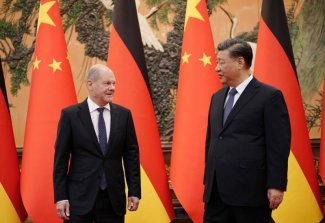Cooperation in spite of everything. Scholz’s visit to China

On 4 November, Chancellor Olaf Scholz visited Beijing, where he met with Chairman of the People’s Republic of China (PRC) Xi Jinping and Prime Minister Li Keqiang. Scholz was accompanied by representatives of German companies, including Volkswagen, BMW, BASF, Bayer and Deutsche Bank. One of the topics discussed with Xi was the Russian invasion of Ukraine, Scholz stressing the importance of Beijing exerting influence on Moscow to make it abide by the principles of the UN Charter. Both sides of the meeting agreed that threats to use nuclear weapons are “irresponsible and dangerous”.
In the context of China’s drive to seize Taiwan, Scholz stressed that Germany, like the US and many other countries, is pursuing the “One China” policy. Accordingly, any changes to the status quo of Taiwan should be made “only peacefully and by mutual consent”. During the talks, Scholz also raised the issue of human rights. According to him, the universal nature of these rules and their recognition by all UN members mean that reminding people of the need to respect these principles does not constitute interference in a country’s internal affairs. In this context, he mentioned Xinjiang province, with its massive human rights violations against Uyghurs and Kazakhs.
Scholz also referred to Sino-German economic relations, noting the problems of EU companies in accessing the Chinese market. He pointed out that the application of economic measures against one EU country de facto targets the entire EU common market, and that sanctions imposed by Beijing on MEPs are unacceptable. At the same time, he stressed the importance of cooperation between China, Europe, the US and “other major countries” in the fight against global challenges such as COVID-19, climate change, securing biodiversity, hunger and global debt. Scholz said agreement had been reached to establish a Chinese-German dialogue on climate and energy transition. The Chinese government has agreed to use BioNTech’s vaccine against COVID-19 to vaccinate foreigners residing in China.
Commentary
- Beijing’s strategic objectives regarding Germany and the EU remain to maintain the unilateral opening of the EU economy to Chinese investment and products, and to ensure Chinese entities continue to have access to Western technologies. Maintaining the German economy’s dependence on the Chinese market (about 10% of Germany’s foreign trade) is also expected to help block US efforts to coordinate its China policy with the EU. To this end, Beijing is ready to make certain concessions to selected German corporations, especially those with influence in political spheres. Scholz’s visit was accompanied by a Chinese propaganda offensive emphasising the need to develop the EU’s strategic autonomy, implicitly calling for a move away from the alliance with the United States. From the point of view of Beijing’s domestic narrative, the German chancellor’s arrival just days after the conclusion of the 20th Chinese Communist Party (CCP) Congress is a way to strengthen external legitimacy for the overhaul of the socio-political system ushered in by Xi Jinping.
- Even before the visit, Scholz’s trip to Beijing was widely reported in the German media. The main focus of the discussion was the high level of dependence which Germany’s economy has on China in terms of trade and investment. This was compared to Germany’s dependence on Russian energy resources, raising concerns about the consequences for the local economy should relations between Berlin and Beijing deteriorate (see ‘A dangerous resemblance. Moves to revise Germany’s China policy’). The agreement on the sale of a 24.9% stake in the Hamburg container terminal to the COSCO shipping company was cited as an example of the deepening of this phenomenon (see ‘Selling shares in the Hamburg terminal: Scholz does not want a clash with China’), as were Silex’s plans to acquire the Elmos Semiconductor factory in Dortmund (Silex is owned by China’s Sai Micro Electronics).
- The stance of the chancellor’s office prior to the visit indicated the government’s desire to continue the conciliatory policy of the previous CDU/CSU-SPD cabinet – the decision on the port of Hamburg and the invitation of representatives of Germany’s largest companies to travel (following the example of Chancellor Angela Merkel’s earlier trips) demonstrated Berlin’s desire to avoid confrontation with its most important trading partner during the energy crisis and the related economic problems facing Germany. Scholz stressed the need for further economic cooperation with China while diversifying the investment and trade activities of German companies. Decoupling is expected to lead to the dismantling of globalisation, which Scholz would view as unfortunate since it (globalisation) “has brought great prosperity to the world”. In addition, the participation of representatives of major companies in the meeting was a sign that German companies do not intend to withdraw from China despite the growing problems of operating in the market there. On the contrary, some of them intend to expand their presence (e.g. BASF).
- Scholz’s statements indicating the need for cooperation with China contrast with the much more confrontational rhetoric of Foreign Minister Annalena Baerbock (Greens). During her visit to Kazakhstan and Uzbekistan (30 October – 2 November), she pointed out that the chancellor’s visit to China should emphasise the policy arrangements with Beijing enshrined in the coalition agreement, including respect for human rights and international law and ensuring competition “on a fair basis”. Baerbock also stressed that the Chancellery had chosen the departure date. Scholz – with his decision to travel in early November – became the first Western leader to visit China after the 20th CCP Congress, which decided, among other things, to deepen state centralisation policies and intensify the ideologisation of Chinese people’s lives (see ‘The inauguration of the 20th Congress of the Communist Party of China’). Differences in positions between the Chancellery and the Ministry of Foreign Affairs undermine the possibility of smoothly preparing an inter-ministerial strategy on China, which is being coordinated by the Foreign Ministry.
- Scholz’s visit was intended to show that in his China policy – despite the maintained economic and political cooperation – the Chancellor does not overlook contentious issues in both bilateral and EU-China relations. A reference to Beijing’s imposition of an embargo on imports of products from Lithuania (see ‘Germany and the trade conflict between Lithuania & China’) demonstrated that Scholz represents the interests not only of Germany, but also of the EU as a whole. This move is meant to offset criticism over the failure to invite representatives of other member states to the trip (according to media reports, Germany rejected France’s suggestion of a joint visit with President Emmanuel Macron) or EU institutions, which undermined Berlin’s declared European dimension of its strategy on China. The mention of Xinjiang and US in the context of the “One China” principle and Taiwan was also meant to signal that Scholz is pursuing a policy toward the PRC while taking into account the alliance with the United States and the coalition agreement.
- Germany is also taking steps to prevent the impression that it is continuing its “China first” policy, pushing other Indo-Pacific countries into the background. Scholz’s visit to China comes at a similar time to German President Frank-Walter Steinmeier’s trip to Japan and South Korea, as well as consultations between the heads of Germany’s Defence and Foreign ministries and their Japanese counterparts. In addition, Chancellor Scholz will visit Vietnam and Singapore on 13 and 14 November, where he will attend the 17th Asia-Pacific Conference of German Business.




